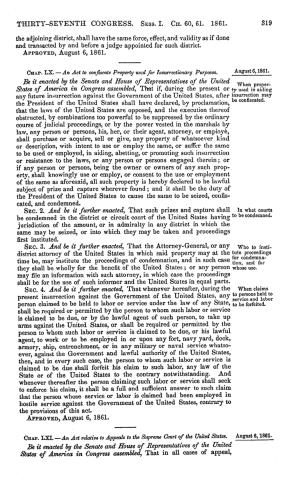
Description
After the breakout of the Civil War, on July 4, 1861, President Abraham Lincoln convened a special session of Congress. One issue that needed to be addressed was legislation addressing how to deal with slaves being used to aid the war effort of the Confederacy, including those that escaped their masters, made their way to Union lines and were confiscated as contraband of war, such as illustrated in the (Fort) Monroe Doctrine. Section 1 of the August 6, 1861, Confiscation Act clearly stated that any property used in support of the rebellion against the United States government was eligible for confiscation. Section 4 of the law dealt specifically with slaves as contraband and declared that any person who claimed ownership of a fugitive slave "shall forfeit his claim to such labor" if such slave was forced to support the Confederacy in his labor in any type of military capacity. Due to the vagueness of this phrase, debate ensued over whether or not this law expressly emancipated slaves as contraband. Overall, this law gave legislative support to the contraband policy already being followed by much, but not all, of the Union army.
Full Transcript of the First Confiscation Act: Chap. LX
Transcribed Excerpts from the First Confiscation Act: Chap. LX
Source-Dependent Questions
- Select one passage from Section 1 that best captures your interpretation of it. Provide reasoning for your selection.
- According to Section 4, what requirements must be met for a slave to become property eligible for confiscation ("contraband") by the Union?
- There was a debate at the time in Congress and the public over whether or not Section 4 emancipated slaves that had been confiscated as contraband. Use the phrase, "the person to whom such labor or service is claimed to be due shall forfeit his claim to such labor, any law of the State or of the United States to the contrary notwithstanding," to help explain both sides of the argument.
- Explain how this law would have impacted slaves and their owners in the border states (Missouri, Kentucky, Maryland and Delaware) that remained loyal to the Union, yet allowed slavery.
Citation Information
"Chap. LX - An act to confiscate Property used for Insurrectionary Purposes," U.S. Congress, pp. 319, 6 August 1861. Courtesy of Library of Congress